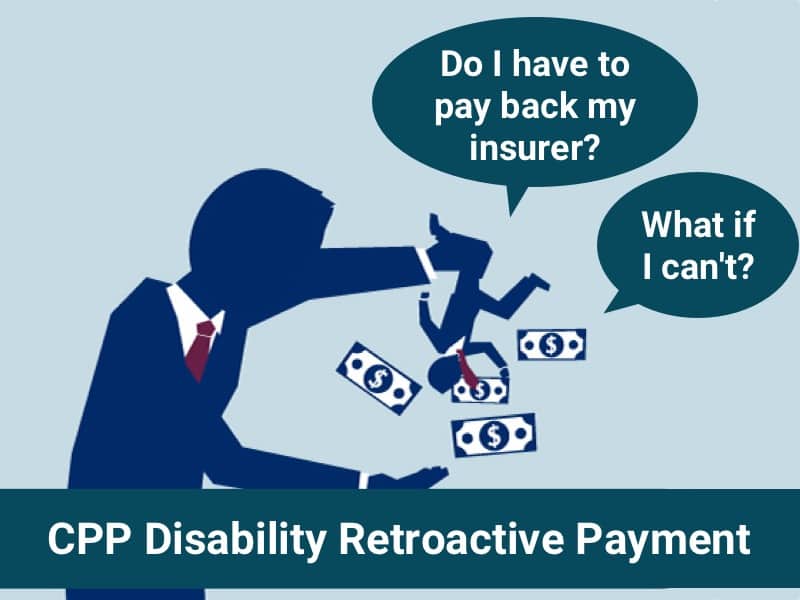So, you’ve received a sum of money as a retroactive payment from CPP disability — or maybe you opened a letter from your long-term disability insurer that says, “Hey, you owe us.” If you’re wondering why this is happening and what you need to do next, then this article is for you. Read on.
This article is part of our Ultimate Guide to Long-term Disability Benefits.
What is the CPP disability retroactive payment?
You receive the CPP disability retroactive payment when you are first approved for the benefit. Service Canada issues a one-time payment to represent the past disability benefit you were eligible for before you applied and got approved. As of January 2020, the maximum amount you can receive is 12 months back from the time your completed application was received.
Offsets and LTD overpayments
Most insurance policies allow the insurer to offset the payments of other benefits that you receive. This means they will reduce their payment by the same amount you are getting from other sources, usually dollar-for-dollar.
In some cases, your insurer will ask you to apply for CPP disability benefits. Most policies do require people to apply. Once approved, they often have the right to deduct the amount from your current monthly LTD payment. Even if you don’t apply for CPP, the insurance company might still have the right to deduct the amount you would hypothetically receive from this (or other sources).
For example
Let’s say you receive $2000/month for long-term disability from your insurer. You get approved for CPP disability for $1000/month. Your insurer will deduct $1000 from what they pay you. So, you still receive $2000 — $1000 from your LTD insurer and $1000 from CPP disability. This is just one of the ways the insurance company saves money.
You can read more about this situation here: 6 Reasons To Apply For CPP Disability, Even Though the Insurance Company Gets the Money
Some other common offsets might include money from workers’ compensation, personal injury settlements, or employment severance payments. All of these offsets can lead to your insurance company “overpaying” you and asking to be reimbursed.
You might be wondering: What does this have to do with the CPP disability retroactive payment?
When you receive the CPP disability retroactive payment, the insurance company will often claim that you were “overpaid” if they also paid you during the months that the CPP money is meant to cover. If the policy states that they are allowed to offset other benefits, the insurance company will ask you to pay that money back to them — usually, the entire sum.
Do I have to pay it back?
In 99% of cases, the insurance company is entitled to repayment for any month where there was an overlap between the retroactive CPP payment and your LTD benefits. Usually, this means that you must pay almost the entire retroactive payment back to the insurance company.
Most long-term disability insurance policies contain a section that outlines this. Because it’s in the policy, there’s really no way out of paying it back.
What if I don’t tell my insurer?
If you don’t tell the insurer, you risk the chance that they find out on their own. If they find out, you will still owe them, and you will still have to pay it back. You should never withhold this type of information from them.
In many cases, the insurance company will be the one asking you to apply for CPP disability in the first place. If you don’t tell them when they realize you have already applied and are approved, you will owe them any retroactive payment. On top of that, you will owe them any monthly amount that they have been overpaying you moving forward. This results in you owing them a much larger sum.
In a worst-case scenario, they could use the fact that you were dishonest with them as a sign of a larger issue and terminate your LTD benefit. Under the policy, both you and the insurance company have a duty of good faith. You must be open and honest; don’t mislead or withhold information. If you do, you’re violating the terms of the policy. Some insurance companies take a hard stance and view this as you breaking the contract, and they can stop your payments because of it. However, they are more likely to keep your benefits going and collect what you owe them by reducing your LTD payments.
CPP disability retroactive and LTD overpayment: options
Usually, an insurer will give you notice that you need to repay the overpayment in full — but we have seen many cases where people don’t hear about it until long after the money has been spent. We always recommend that you don’t spend any of the CPP retroactive payments, so the most ideal situation would be to pay the money back as soon as you receive it.
But, if you are unable to pay the insurer back, there are a few things they might do:
- They may withhold or reduce your monthly LTD payment. Often, insurers will deduct up to 50% of a person’s monthly benefit in order to collect on an outstanding overpayment debt. If you don’t (or can’t) pay the full overpayment back soon after receiving the lump sum from CPP, insurers might simply reduce your payments as such. Whether they can do it depends on the wording of your policy. Usually, they are allowed to.
- They may work with you to figure out a payment plan, although this is at their discretion; they’re under no obligation to set up an arrangement with you.
- They may demand that you pay back the entirety of the retroactive payment in a specific window of time.
- They may bring a lawsuit against you. It’s common for insurance companies to file a lawsuit against the claimant in these situations. These lawsuits are hard to defend because, legally, you owe them the money in most cases. They use the lawsuit process to get a judgment against you. Once they have the judgment, they can put liens on your property or bank accounts.
Another option, in some cases, would be to declare bankruptcy. You would need to seek advice from a bankruptcy trustee to determine if bankruptcy would remove this debt.
Can I sue?
Basically, the answer is no. You cannot sue your insurer for this. In fact, you have technically broken the contract, so, as stated above, they are the ones with the right to sue you! The insurance company doesn’t lose the right to the monies owed just because they didn’t collect immediately.
Unfortunately, that falls on you. A judge probably won’t have sympathy for you in a situation like this. You know that you owe the money to the insurer. You didn’t pay the money owed, and they still have a right to the money.
Next steps – Get your free book
If you’re still unsure of what actions you need to take or have any questions, please feel free to call us toll-free at (888) 480-9050 or schedule a free consultation online. Please note that we can only give general advice during a free consultation.



